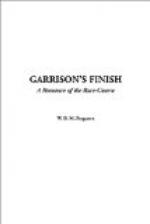“Is the major going in for the Carter this year?” asked the girl, turning to Mrs. Calvert. “Who will he run—Dixie?”
“I think so. She is the logical choice.” Mrs. Calvert was nervously prodding the gravel with her sunshade. “Sometimes I wish he would give up all ideas of it.”
“I think father is responsible for that. Since Rogue won the last Carter, father is horse-mad, and has infected all his neighbors.”
“Then it will be friend against friend,” laughed Mrs. Calvert. “For, of course, the colonel will run Rogue again this year—”
“I—I don’t think so.” The girl’s face was sober. “That is,” she added hastily, “I don’t know. Father is still in New York. I think his initial success has spoiled him. Really, he is nothing more than a big child.” She laughed affectedly. Mrs. Calvert’s quiet, keen eyes were on her.
“Racing can be carried to excess, like everything,” said the older woman, at length. “I suppose the colonel will bring home with him this Mr. Waterbury you were speaking of?”
The girl nodded. There was silence, each member of the trio evidently engrossed with thoughts that were of moment.
Mrs. Calvert was idly thumbing over the race-track annual. “Here is a page torn out,” she observed absently. “I wonder what it was? A thing like that always piques my curiosity. I suppose the major wanted it for reference. But then he hasn’t seen the book yet. I wonder who wanted it? Let me—yes, it’s ended here. Oh, it must have been the photograph and record of that jockey, Billy Garrison! Remember him? What a brilliant career he had! One never hears of him nowadays. I wonder what became of him?”
“Billy Garrison?” echoed Garrison slowly, “Why—I—I think I’ve heard of him—”
He was cut short by a laugh from the girl. “Oh, you’re good! Why, his name used to be a household word. You should have heard it. But, then, I don’t suppose you ever went to the track. Those who do don’t forget.”
Mrs. Calvert walked slowly away. “Of course you’ll stay for lunch, Sue,” she called back. “And a canter might get up an appetite. William, I meant to tell you before this that the major has reserved a horse for your use. He is mild and thoroughly broken. Crimmins will show him to you in the stable. You must learn to ride. You’ll find riding-clothes in your room, I think. I recommend an excellent teacher in Sue. Good-by, and don’t get thrown.”
“Are you willing?” asked the girl curiously.
Garrison’s heart was pounding strangely. His mouth was dry. “Yes, yes,” he said eagerly.
The tight-faced cockney, Crimmins, was in the stable when Garrison, in riding-breeches, puttee leggings, etc., entered. Four names were whirling over and over in his brain ever since they had been first mentioned. Four names—Sis, Waterbury, Garrison, and Crimmins. He did not know whey they should keep recurring with such maddening persistency. And yet how familiar they all seemed!




